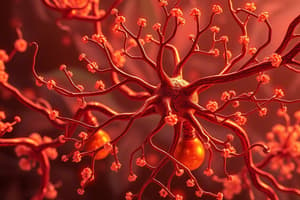Podcast
Questions and Answers
Ciamar a bhios CamScanner a' freagairt ri freagairtean sam bith?
Ciamar a bhios CamScanner a' freagairt ri freagairtean sam bith?
- A' dèanamh sgrìobhainnean a thuilleadh.
- A' leughadh na sgrìobhainnean gu fèin.
- A' dèanamh na sgrìobhainnean gu foirm PDF. (correct)
- A' gabhail agus a' roinn dhealbhan.
Dè na feartan a th' aig CamScanner a bhios inntinneach do luchd-cleachdaidh?
Dè na feartan a th' aig CamScanner a bhios inntinneach do luchd-cleachdaidh?
- Ro-shealladh de chòraichean.
- Dèanamh PDF àireamhach.
- Sìmplidheachd ann an luchdachadh sìos.
- Suathadh fìor-amas. (correct)
Ciod a bhios a' tachairt nuair a tha ceangal làidir eadar an eadar-lìon?
Ciod a bhios a' tachairt nuair a tha ceangal làidir eadar an eadar-lìon?
- A' leigeil seachad leasachaidhean.
- A' milleadh air na sgrìobhainnean.
- A' meudachadh luaths luchdachadh. (correct)
- A' cur bacadh air a' bhrosnachadh.
Dè a th' ann an CamScanner mar a chaidh a chleachdadh gu tric ann an leasanan?
Dè a th' ann an CamScanner mar a chaidh a chleachdadh gu tric ann an leasanan?
Dè an àireamh de dh’innealan a dh’fheumas CamScanner?
Dè an àireamh de dh’innealan a dh’fheumas CamScanner?
Flashcards
CamScanner
CamScanner
Sgrìobhainnean a tha air an scanadh le bhith a’ cleachdadh camara fòn-làimhe no tablet.
Comharran Leughaidh
Comharran Leughaidh
Bidh CamScanner a’ dèanamh feum de chomharran-leughaidh gus pàirtean de dhocaiméid a chomharrachadh le chèile agus a chuir ri chèile.
Roinnte
Roinnte
Leigidh CamScanner leat do sgrìobhainnean a chaidh a sganadh a bhith air an roinn ann an diofar fhòrmaidean, leithid PDF agus JPG, leat fhèin no le daoine eile.
Stòradh
Stòradh
Signup and view all the flashcards
Deasachadh
Deasachadh
Signup and view all the flashcards
Study Notes
Neuromuscular Junction Disorder
- An abnormality of the neuromuscular junction (NMJ) typically presents with painless weakness.
- This is regardless of the cause.
Objective
- Understand the basics of neuromuscular junction pathophysiology.
- Familiarise yourself with disorders connected to the NMJ.
- Learn the pathology of Myasthenia Gravis.
- Learn the pathology of Lambert-Eaton myasthenic syndrome.
Neuromuscular Junction Anatomy
- Axon: Component of a nerve.
- Nerve Terminal: End of a nerve.
- Mitochondrion: Organelle in nerve terminal.
- Synaptic Vesicle: Stores neurotransmitters.
- Acetylcholine Receptors (ACh receptors): Located on the muscle fiber.
- Muscle Fiber: The muscle cell.
Neurotransmitter Process
- Synaptic Vesicle: Contains neurotransmitters.
- Voltage-gated Ca2+ channel: Opens due to nerve impulse. Allows calcium entry.
- Post-synaptic density: Region near the receptor.
- Neurotransmitters: Released into the synaptic cleft.
- Neurotransmitter Receptors: Bind neurotransmitters.
- Neurotransmitter re-uptake pump: Recycles unused neurotransmitters.
Antibody-Mediated Diseases of the Neuromuscular Junction
-
Myasthenia Gravis
-
Lambert-Eaton myasthenic syndrome
Myasthenia Gravis
- An autoimmune disorder commonly linked to autoantibodies targeting acetylcholine receptors.
- This causes damage to postsynaptic membranes and a reduction in acetylcholine receptors.
- This limits muscle response to acetylcholine.
Myasthenia Gravis Pathophysiology
- Autoantibodies: Target acetylcholine receptors.
- Acetylcholine Receptors: Located on the postsynaptic membrane.
- Synaptic Cleft: Area between neuron and muscle.
- Postsynaptic Membrane: Damage prevents muscle activation.
Pathogenesis of Myasthenia Gravis
- About 85% of patients have autoantibodies against postsynaptic acetylcholine receptors.
- The remaining patients have antibodies against sarcolemmal protein muscle-specific receptor tyrosine kinase.
Anti-acetylcholine Receptor Antibodies
- Thought to cause aggregation and degradation of receptors within postsynaptic membranes.
- These Antibodies cause damage through complement fixation leading to a reduced number of acetylcholine receptors.
Autoantibodies against muscle-specific receptor tyrosine kinase
- These antibodies interfere with the trafficking and clustering of acetylcholine receptors within the sarcolemmal membrane.
- A consequent effect is a reduction in acetylcholine receptor function.
Thymic Abnormalities in Myasthenia Gravis
- A strong association exists between pathogenic antiacetylcholine receptor autoantibodies and thymic abnormalities.
- About 10% of myasthenia gravis patients display thymoma, a cancerous thymic epithelial cell tumor.
Clinical Picture of Myasthenia Gravis
- Head position: May maintain a flexed posture and be unable to fully extend.
- Mental status: Normal cognition.
- Speech: Dysarthric.
- Eyes: Partial ptosis (drooping).
- Pupils: bilaterally equal and responsive to light.
- Cranial nerves: Normal eye movement.
- CN 9 and 10 (soft palate): May not move.
- Limbs: Normal examination and reflexes.
- Sensation: No deficits.
- Cerebellar function: Normal.
- Fatigue: Occurs with repetitive motions, e.g., closing the eyes.
- No abnormalities: Observed in a general examination.
Treatment of Myasthenia Gravis
- Acetylcholinesterase inhibitors: Used to enhance acetylcholine levels at the neuromuscular junction.
- Plasmapheresis and immunosuppressive drugs (glucocorticoids, cyclosporine, rituximab): Can decrease autoantibody titers and control symptoms.
- Thymectomy: Effective in patients with thymoma.
Lambert-Eaton Myasthenic Syndrome
- An autoimmune disorder where antibodies block acetylcholine release by inhibiting presynaptic calcium channels.
- In contrast to myasthenia gravis, repeated stimulation improves muscle activity after some time.
Symptoms of Lambert-Eaton Myasthenic Syndrome
- Patients typically present with weakness of their extremities.
- In half of cases, there is an underlying neuroendocrine carcinoma of the lung.
- Symptoms may precede cancer diagnosis by years.
Quiz Question (1)
- Myasthenia Gravis dysfunction occurs in neuromuscular junctions.
Quiz Question (2)
- Resting tremor is not commonly associated with Myasthenia Gravis.
Studying That Suits You
Use AI to generate personalized quizzes and flashcards to suit your learning preferences.



